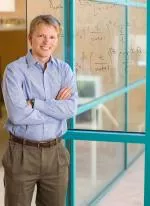
Big Data, Global Development, and Complex Social Systems
Nathan Eagle, Omidyar Fellow at the Santa Fe Institute
Monday, November 16, 12:30 pm
Berkman Center, 23 Everett Street, second floor
RSVP required for those attending in person ([email protected])
This event will be webcast live at 12:30 pm ET and archived on our site shortly after.
Petabytes of data about human movements, transactions, and communication patterns are continuously being generated by everyday technologies such as mobile phones and credit cards. This unprecedented volume of information facilitates a novel set of research questions applicable to a wide range of development issues. In collaboration with the mobile phone, internet, and credit card industries, my colleagues and I are aggregating and analyzing behavioral data from over 250 million people from North and South America, Europe, Asia and Africa. I will discuss a selection of projects arising from these collaborations that involve inferring behavioral dynamics on a broad spectrum of scales; from risky behavior in a group of MIT freshman to population-level behavioral signatures, including cholera outbreaks in Rwanda and wealth in the UK. Access to the movement patterns of the majority of mobile phones in East Africa also facilitates realistic models of disease transmission as well as slum formations. This vast volume of data requires new analytical tools - we are developing a range of large-scale network analysis and machine learning algorithms that we hope will provide deeper insight into human behavior. However, ultimately our goal is to determine how we can use these insights to actively improve the lives of the billions of people who generate this data and the societies in which they live.
About Nathan
Nathan Eagle is an Omidyar Fellow at the Santa Fe Institute. His research involves engineering computational tools, designed to explore how the petabytes of data generated about human movements, financial transactions, and communication patterns can be used for social good. He holds a BS and two MS degrees from Stanford University; his PhD from the MIT Media Laboratory on Reality Mining was declared one of the '10 technologies most likely to change the way we live' by the MIT Technology Review. His academic work has been featured in Science, Nature and PNAS, as well as in the mainstream press.
Links
You might also like
- communityThe Digital Panopticon Nightmare
- communityComparing Apples to Oranges